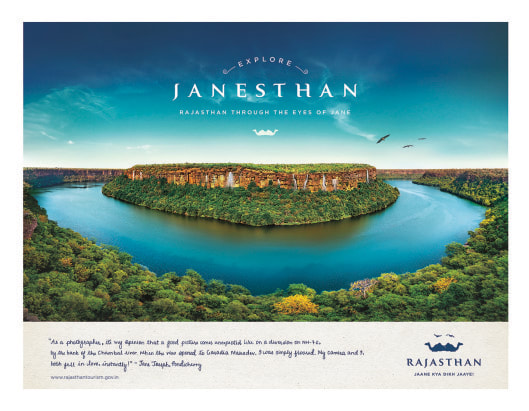Place branding
Has the time come for Place Brands in India?
After being associated with various place branding / destination branding projects, when I came back to India, I thought it’s probably the best time for a country with 29 states, 7 union teritories, 4000 cities and 640,867 villages to start thinking of this practice seriously.
Place branding is not nationalism. It’s not limited to nation our country. There are numerous cities, towns, precincts, local government councils, tourist destinations who have developed their own brands in Australia, Europe and US. It helps them to build a better community, attract tourism, attract investments, nurture the heritage, build exports and improve governance.
Currently only two major initiatives are rapidly building brand India. First is Incredible India, which is primarily focused on tourism and is mainly communicated outside India. And second is Brand Modi, which has become an internationally recognized Indian icon. And then there are others like Yoga, Cricket and Indian call centers etc. that build India’s reputation.
Similar to Incredible India some states are promoting tourism through really creative ad campaigns. But is that enough? Should only beautifully shot images of tourist spot form a perception about the place? I believe the narrative and story that needs to be built is lacking.
Although some Indian place brands have created their own differentiation like Mumbai as the financial capital of India, or Varanasi as the traditional city or Kolkata as intellectual powerhouse. But all these have grown organically through years. There hasn't been a real effort of undertaking brand initiatives to develop or maintain the brand perception of these place brands.
India has a federal structure of government so giving states their own identities can be a bit controversial. For example Jammu Kashmir has their own official flag or Karnataka State is fighting for one. Although flag is one of the greatest symbolisms, it certainly might divide the country. But place branding is much more than this basic symbolism. It’s an abstract idea, it's a mindset, a culture and a certain understanding, reputation and perception that’s created around a particular place.
India is a diverse country. Places have their own cultural traits, practices, symbols, languages, arts, music, cuisines, literatures, monuments, local sports, philosophies, architectures, stereotypes, histories, innovations, industries, landscapes, unique stories. Place branding activity can nurture all these. It can also highlight them to the world. For example Smart cities is a great initiative, but we didn't hear anything about Bhubaneswar, or Pune or any other smart city during the 2019 election campaigns. It was a perfect example of a missed opportunity to convert these smart cities into place brands.
Branding helps to put things in perspective and inspire people to work harder towards making their brand vision come true. When everyone in the world is hailing India as a fastest growing country in the world, place branding can play a very crucial role in this growth path. On a micro level, these place brands can really resonate with people, inspire them and herd them together towards a singular goal.
Place branding also helps in building a sense of place, sense of community, sense of belonging for the people. After all growth is not just about impressive economic indicators, it is also about people’s lives. Bhutan for example considers their gross national happiness index more important than their gross domestic product. If people feel more connected to their place, or community they will happily participate in its development.
Brand also increases expectations of people from the administrators and politicians. This will further lead to their increase of performance and delivery. But to achieve this domino effect it’s very important to take the first step towards place branding.
How is this possible in a politically driven democracy where slow and need based decision-making is a norm. How will place branding find it place in policy-making circles and motivate them to so something that hasn't been ever done or even thought about. In any case it will be very interesting to see what place brands arise from India in coming future and what will be their unique ideas, what will be their unifying factors and how they will diversify from each other. Hopefully policy makers are listening.
Place branding is not nationalism. It’s not limited to nation our country. There are numerous cities, towns, precincts, local government councils, tourist destinations who have developed their own brands in Australia, Europe and US. It helps them to build a better community, attract tourism, attract investments, nurture the heritage, build exports and improve governance.
Currently only two major initiatives are rapidly building brand India. First is Incredible India, which is primarily focused on tourism and is mainly communicated outside India. And second is Brand Modi, which has become an internationally recognized Indian icon. And then there are others like Yoga, Cricket and Indian call centers etc. that build India’s reputation.
Similar to Incredible India some states are promoting tourism through really creative ad campaigns. But is that enough? Should only beautifully shot images of tourist spot form a perception about the place? I believe the narrative and story that needs to be built is lacking.
Although some Indian place brands have created their own differentiation like Mumbai as the financial capital of India, or Varanasi as the traditional city or Kolkata as intellectual powerhouse. But all these have grown organically through years. There hasn't been a real effort of undertaking brand initiatives to develop or maintain the brand perception of these place brands.
India has a federal structure of government so giving states their own identities can be a bit controversial. For example Jammu Kashmir has their own official flag or Karnataka State is fighting for one. Although flag is one of the greatest symbolisms, it certainly might divide the country. But place branding is much more than this basic symbolism. It’s an abstract idea, it's a mindset, a culture and a certain understanding, reputation and perception that’s created around a particular place.
India is a diverse country. Places have their own cultural traits, practices, symbols, languages, arts, music, cuisines, literatures, monuments, local sports, philosophies, architectures, stereotypes, histories, innovations, industries, landscapes, unique stories. Place branding activity can nurture all these. It can also highlight them to the world. For example Smart cities is a great initiative, but we didn't hear anything about Bhubaneswar, or Pune or any other smart city during the 2019 election campaigns. It was a perfect example of a missed opportunity to convert these smart cities into place brands.
Branding helps to put things in perspective and inspire people to work harder towards making their brand vision come true. When everyone in the world is hailing India as a fastest growing country in the world, place branding can play a very crucial role in this growth path. On a micro level, these place brands can really resonate with people, inspire them and herd them together towards a singular goal.
Place branding also helps in building a sense of place, sense of community, sense of belonging for the people. After all growth is not just about impressive economic indicators, it is also about people’s lives. Bhutan for example considers their gross national happiness index more important than their gross domestic product. If people feel more connected to their place, or community they will happily participate in its development.
Brand also increases expectations of people from the administrators and politicians. This will further lead to their increase of performance and delivery. But to achieve this domino effect it’s very important to take the first step towards place branding.
How is this possible in a politically driven democracy where slow and need based decision-making is a norm. How will place branding find it place in policy-making circles and motivate them to so something that hasn't been ever done or even thought about. In any case it will be very interesting to see what place brands arise from India in coming future and what will be their unique ideas, what will be their unifying factors and how they will diversify from each other. Hopefully policy makers are listening.




